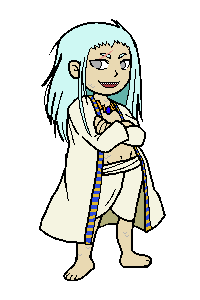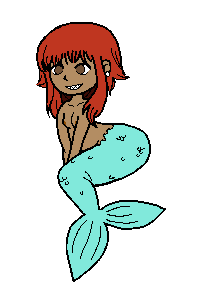| MURUCH |
  |
| FINNED AND FREE |
| In the water, the muruch are as agile and fast as any fish, propelled by muscular flukes in place of legs. In this form they are nearly eight feet long from head to tail. Their lower bodies are covered with shiny scales, with different tribal and family groups exhibiting different coloration and patterning. The skin of their upper body tends toward darker tans, pale muruch can be found at the arctic extremes of their ranges, and deep-ocean dwellers sometimes have a greenish or blue cast to their skin. Muruch have larger eyes, some even bulging slightly. When emerging onto land, muruch can change their fins temporarily to legs. |
| GOLDFISH MEMORIES |
| Muruch personalities are often mercurial. Little is permanent in their lives: they build no settlements, they migrate following the seasons or sources of food, their agreements with surface-dwellers rarely last beyond the horizon, and even tribal or pod affiliations can be discarded or forged several times during a muruch’s lifespan. Partnerships and enmities can be intense for as long as they last. While they understand the need to be wary when someone has wronged them once before, muruch are puzzled by grudges. If they have a problem, it can frequently be solved by picking up and moving. |
| INCONSTANT NEIGHBORS |
| As apt to be playful as merciless, muruch might
raid one settlement for what they need, and greet the next ship by
playing in its wake and trading fresh food for sailor’s trinkets.
Some tribes and pods show one extreme or the other, but most often
it is dictated by the group’s immediate needs and relative
strength. This leads to wariness and superstition on the part of
surface dwellers trying to predict the outcome of a meeting with
muruch. |
| LEAVING SCHOOL |
| A muruch on the path of adventure most often
came to it of their own whim, taking leave of their pod for their
own reasons. While some might have been cast out, or a survivor of
a pod scattered by misfortune or violence, this is more rare. |
| MURUCH NAMES |
| A muruch has a given name and frequently an
earned description. Given names tend to be simple and short.
Descriptions might note an accomplishment or typical demeanor and
might not be entirely complimentary. Descriptions: the Languid, the Singer, the One-Eyed, the Ugly, Scarface, Longtail |
| MURUCH TRAITS |
| Ability score increase. Your
Strength score increases by 2. Age. Muruch reach adulthood in their late teens and live less than a century. Alignment. Muruch are wild and capricious, tending toward chaos. Size. In water, muruch are around 8 feet in length. On land they can be between 5 and 6 feet tall. In either state they are around 220 pounds. Your size is Medium. Speed. In water, your base swim speed is 40 feet. On land, your base walking speed is 30 feet. Amphibious. You can breathe water and air. Land Legs. When on land, you can turn your tail into legs and walk upright as normal. This transformation takes 1 minute. Each day you go without full submersion in clean water and a return to your natural state you gain 1 level of exhaustion. This exhaustion may be removed as normal only when in your natural state and with access to enough clean water for full submersion. Engaging in combat on the surface without turning your tail into legs uses the Prone rules. Muruch Combat Training. You have proficiency with the trident, net, and heavy crossbow. Move Like Water. You have advantage on Dexterity saving throws. Languages. You can speak, read, and write Common and Muruch. Muruch is musical and flowing, supplemented with gestures and signing easier to use underwater. It is written with bold and simple symbols. Subraces. Two main subraces of muruch exist: riverine and blue water. Riverine Muruch As a riverine muruch, your pod plies the inland waterways, coming into contact with surface dwellers far more often. Riverine muruch are watchful and canny, sizing up potential threats and allies from the safety of the water. Ability score increase. Your Wisdom score increases by 1. Cold Read. You have proficiency in the Insight skill. Rapid Recovery. Riverine muruch recover two levels of exhaustion during their first long rest. Blue Water Muruch Blue water muruch dwell in the saltwater shorelines of the world’s oceans and seas, sometimes migrating over enormous depths and distances. Accustomed to deeper waters, they display amazing agility and aquatic acrobatics. Ability score increase. Your Dexterity score increases by 1. Ocean Tongues. Through sounds and gestures, you can communicate simple ideas to Small or smaller fish. Innate spellcasting. You know the friends cantrip. |
| MURUCH ADDENDA |
| Water Born It has long been known that muruch can breed with humans. The offspring of such unions are always the race of the mother. This ability has been the source of spirited debate among natural philosophers for millenia now. How related are the origins of the two races? Did one spring from the other, did they share a common ancestor, or is it the will of the gods or some other form of arcane tampering? Just as intriguing, does it mean that the geographical origin of humans was the continent which was broken into the Isles, or the Mor Dyfn itself? The answers to these questions may lie too far in the past to be brought to the surface. The Weight of Civilization At a distance, and with sporadic contact, the muruch are a source for intriguing tales, allure, and excitement. Settled populations, almost exclusively in coastal cities, present different issues for both muruch and surface dwellers. In open waters, muruch own little and want for less: the oceans and rivers provide a near endless bounty. For muruch that choose to settle down in a city for safety or other reasons, the transition can be difficult. Surface dwelling mortals have different standards of modesty, to say nothing for what the local climate might demand. Finding the next meal is no longer as simple as spearing or netting a fish. Sleeping in the open is right out. Still, there is specialized work to be found for muruch, particularly because they are of a more physical bent than apkallu. Shipbuilding and maintenance, harbor clearing, surface city governors welcome muruch skills and abilities, even if muruch customs do not fit so well. Riverine muruch find more acceptance and are more comfortable in such situations, both through greater contact, and greater understanding of the appropriate distance to be maintained. Trinkets and Trade “A muruch never sells the same thing twice,” is a saying among surface merchants with a certain amount of validity. It is difficult to conduct consistent business with muruch: the tribe might be gone suddenly, or have lost interest in catching whatever fish is in demand. Still, their nomadic nature means they bring more rarities to market than the sedentary but reliable apkallu. Strange creatures, sunken treasure, rare corals, even exotic oils, some things only a muruch can procure, if you can entice them to do so. The next challenge is finding something they want to trade for. Many of the usual staples of surface trade have little meaning to light-traveling muruch. The enterprising merchant’s best bet is small, genuine curiosities, water-impervious tools the muruch cannot make themselves, or light and colorful adornments like faience beads and water silks. |